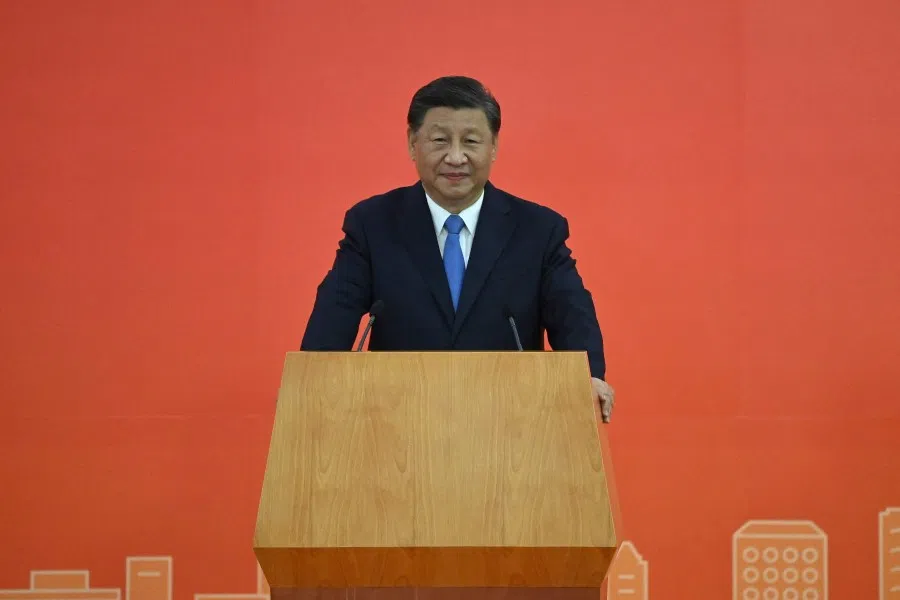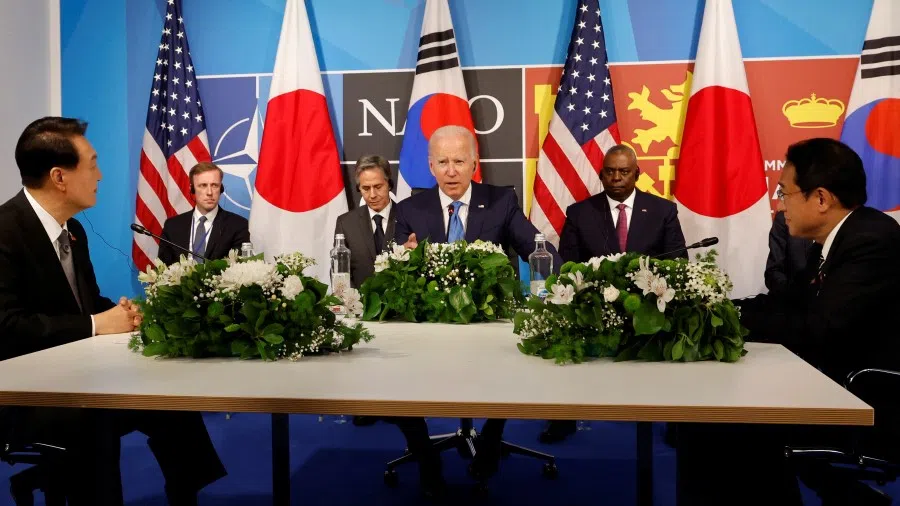What can an increasingly isolated China do?
China's general isolation is impacting its economy and international image, with most other countries having unfavourable views of and little trust in China and its leadership. Taiwanese commentator Chen Kuohsiang looks at the factors leading to the current situation and how China can address it.

China is at its most isolated since the international sanctions imposed on the country in 1989. The US-led global containment of China is in full swing and is seeing results, with liberal capitalist countries becoming more and more antagonistic towards China. Now, the general consensus among many countries is to isolate China.
Hard and soft tactics
There is no doubt that the US's strategic countering of China is the main reason for China's isolation, while the ideological war initiated in line with this strategy has deepened the international community's distaste for China.
A survey of 24,525 people from 19 liberal capitalist countries conducted from February to June this year by US think tank the Pew Research Center found that respondents generally had more favourable views of the US compared with China, while less than a third had favourable views of China.
Pew noted that Asia-Pacific countries showed the biggest gap in favourable views of the US and China, with the most significant difference found in South Korea, where 89% of people had favourable views of the US, against just 19% for China, a gap of 70 percentage points. Only Singapore and Malaysia had more favourable views of China, with a difference of 16 percentage points for China over the US.
Respondents also had generally more favourable views of US President Joe Biden compared with Chinese President Xi Jinping. In Poland and Sweden, the gap in confidence in the two leaders is over 60 percentage points, with confidence in Xi unchanged at a historic low - 45% of respondents have no confidence in Xi as he approaches his third five-year term. Furthermore, over 70% of respondents feel that the military threat from China is a serious problem, which is the main reason for the negative views of China.
The US is actively gathering its allies and containing China with hard tactics in terms of military, trade and technology, as well as soft tactics such as culture, education and media.

The US-led international framework is ramping up its defences against China. Last month, for the first time NATO designated China as a "systemic challenge"; Secretary-General Jens Stoltenberg said, "China is substantially building up its military forces, including nuclear weapons, bullying its neighbours, threatening Taiwan."
Soon after, the US kicked off the Rim of the Pacific naval exercise around the Hawaiian Islands and Southern California region, involving an unprecedented scale of 26 nations, showing its clear intention of establishing a "maritime NATO".
The US is actively gathering its allies and containing China with hard tactics in terms of military, trade and technology, as well as soft tactics such as culture, education and media. One obvious example is the clampdown on Confucius Institutes - the US government has accused China of turning its global network of Confucius Institutes into a propaganda machine and using them to conduct cultural warfare, or even steal secret or sensitive technology, and so the US is ruthlessly hitting out at the institutes. There were 118 Confucius Institutes in the US previously; 104 have been shut or will be shut down within the year.
Japan has evolved from a US agent in East Asia to the vanguard in resisting China, taking big steps forward amid the united front to contain China.
Japan deepening cooperation with NATO
Meanwhile, the fervent containment of China by liberal capitalist countries is due to the differences in thinking and values, and also concerns over national security.
Due mainly to a growing sense of threat from its neighbour China, Japan has evolved from a US agent in East Asia to the vanguard in resisting China, taking big steps forward amid the united front to contain China.

Last month, Japanese Prime Minister Fumio Kishida joined the G7 and NATO summits, and even held several meetings on the sidelines, including a trilateral session with the US and South Korea, and another with South Korea, New Zealand and Australia.
Kishida also invited Stoltenberg to visit Japan and renew the cyber defence and maritime security cooperation documents established in 2014. Japan actively supports NATO's expansion into Asia, and is accelerating its "NATO-isation" in the West Pacific.
Scandinavian countries against China's tight censorship
While Japan has joined the ranks to contain China due to geopolitical reasons, why are the faraway Nordic NATO members (Denmark and Norway) and applicants (Sweden and Finland) also resisting China?
Five years ago, these countries signed memoranda of understanding with Beijing, welcoming the establishment of the China-led Asian Infrastructure Investment Bank in the northern regions. But in recent years, with the discourse over "reeducation camps" in Xinjiang, the protests in Hong Kong and security issue in Taiwan, there has been a fundamental shift in the Nordic countries' views of China, with many of them losing trust in China and considering it a security threat second only to Russia.
An official report from Sweden describes China, Russia and Iran as "hostile states [that] target everything from our constitutional rights and freedoms to our economic prosperity, political decision-making and territorial sovereignty".

The Scandinavian countries are dissatisfied mainly due to Beijing's tightening censorship. A report from Denmark states, "China is adopting increasingly hard-handed and assertive measures to quell criticism of the Chinese Communist Party's policies and China's political system."
Another report from Norway states, "[Chinese] authorities want to ensure that their political adversaries do not feel safe enough to speak out in public."
This is a natural move by the US to maintain its global hegemony, and China's intentions have no bearing on this. However, there is still room for China to manoeuvre.
Room to manoeuvre?
China's isolation has become an international trend, and the strict border controls due to the pandemic have made it more closed off, which is detrimental to China's economy over the short term and its growth in the long run.
Opening up has been an important lifeline for China. Over 40 years, China went from being alienated to being open, from hard communism to the market economy and quasi-capitalism, from extreme backwardness to becoming one of the world's top two powers in economy, technology, military and geopolitics.
The current trend of anti-globalisation is targeted at China, while the US-led global containment is blatant. Of course, the Chinese Communist Party is unhappy with China's isolation. Although the Chinese authorities have reiterated their willingness to open up further and grow along with other countries, the general trend of containment has taken shape.

Amid a worsening environment, China's development in various areas is being hampered, which is seriously damaging its fortunes. This is a natural move by the US to maintain its global hegemony, and China's intentions have no bearing on this. However, there is still room for China to manoeuvre.
For China, the most important thing in countering the blockade is breaking through the bipolar international order established by the US, avoiding becoming the target of collective resistance, finding a countermeasure amid the supply chain decoupling, and seeking long-term stability.
... only openness and connectedness can give China a reference framework and the motivation to achieve scale and reach.
Even in the heat of nationalism, China has to avoid hostility and xenophobia against the West, and going back to a closed state. It also has to get closer to universal values; while there are few tenets that are truly universally applicable, it has to stay closely connected to the mainstream world and move along with it, particularly when it comes to protecting basic human rights and abiding by various existing rules. China cannot move backwards to the standards of the previous century.
Standing on its own will only lead to a lag in growth. Isolation brings no benefit for any country - only openness and connectedness can give China a reference framework and the motivation to achieve scale and reach.
Related: Will China turn its back on the world again? | China's soft power conundrum: The big divide | Are two camps forming around China and the US? | Why the Chinese public is unenthusiastic about further reforms and opening up | China must endure the storm, for time is on its side | | US sets up strategic obstacles against 'autocratic' China





